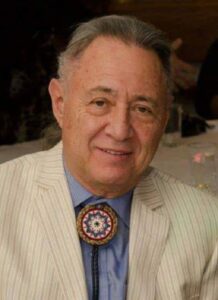Author provides details on history and importance of treaties

By Sam Laskaris
Maurice Switzer continues to provide pertinent information on treaties.
Switzer’s book titled We Are All Treaty People was produced by the Ontario Union of Indians back in 2011.
Switzer, a member of Alderville First Nation, continues to raise awareness of treaties. He recently participated in a Facebook Live talk, also titled We Are All Treaty People, via the Art Gallery of Ontario.
Switzer said it is vital to share information that many, including himself, never learned in school.
“It’s a challenging time when people are asked to consider parts of their country’s past [and it] may not be as idealistic as they would wish, in such a wonderful place to life such as Canada is and has become,” Switzer said. “But it’s important we all know our country’s true history.”
During his talk, Switzer said one million settlers had arrived in eastern Canada by the middle of the 19th century.
This figure was more than the Indigenous inhabitants of the land.
“That’s when the promises began to disappear and to fall off the radar,” Switzer said. “Once they had numerical advantage, they felt they no longer had to keep the pledges that had enabled them to even have dreams of establishing a country.”
Changes came swiftly afterwards.
“It wasn’t long before the government of the day started enacting policies,” Switzer said. “And now, there is no doubt those policies were an attempt to assimilate Indigenous peoples and to destroy Indigenous culture. The feeling was that if all Indigenous peoples were to be civilized—were to be like the poor wretches that lived and worked in Europe as landless farmers — and they were able to because of their agreements to provide land free to settlers that had been the domain of Indigenous peoples forever.”
The Indian Act, launched in 1876, had further impacts.
“Indigenous ceremonies, the very ceremonies that had been used to bring the treaties into existence, were outlawed,” Switzer said. “There are recorded instances of Indigenous peoples being sent to jail for practising their dancing, their songs, which are sacred in nature.”
And one of the most negatives impacts of the Indian Act was the creation of federally-run Indian Residential Schools and Day Schools Indigenous children were forced to attend.
“Canadians should be aware that Indigenous peoples, while they have obviously made contributions to in the past by making their land, sharing their land so settlers could live here, and by defending Canada in numbers unparalleled by any other group in Canada and on this land or in wars abroad, that Indigenous peoples continued to contribute to Canadian life in every sphere, whether it’s sports or the arts or in politics or in medicine,” he said.
Switzer told listeners that everybody, not just Indigenous peoples, have treaty obligations and rights. These include living in communities that have clean drinking water, schools, paved roads, and access to medical facilities among other things.
“We all have treaty rights,” he said. “We all have treaty responsibilities. And the citizens of tomorrow need to start taking political action to ensure that their governments in this country, provincial and federal governments, are keeping the promises that are the foundation of Canada and that the Supreme Courts of this country are continually upholding.”


